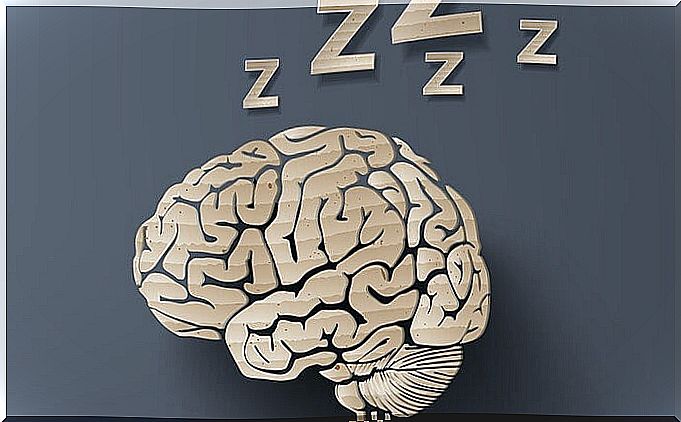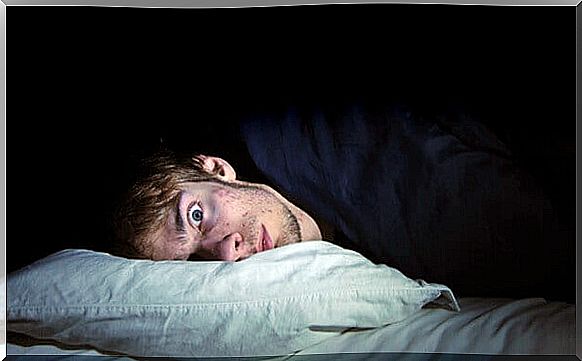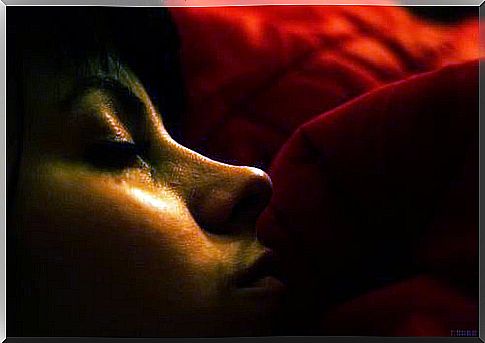Somniloquy, When Speaking While Sleeping

Have you often been told that you talk while sleeping? Somniloquia is an alteration of sleep which is characterized in the person who suffers from it, by the fact of speaking while sleeping. Oddly enough, it is much more common than one might imagine, although not all people manifest it in the same way. Some emit unintelligible sounds, others are able to say simple words …
On the other hand, doubt and fear usually cross the minds of people who suffer from drowsiness. This fear has a close connection with the discovery of secrets that they do not want to reveal. But, can a person with sleepiness maintain a coherent conversation with someone? Could answers she would never consciously reveal escape him?
What does somniloquy really correspond to?
Sleepiness is a parasomnia that is usually more present during youth, although it can also manifest itself if an individual is suffering from stress, anxiety, fever or if they have a mood disorder. . The reason for this alteration is to be found in the lag which takes place between the activation and the inhibition of specific brain areas.
Various areas of the brain are activated and inhibited as we go through the different phases of sleep, which in total are 5: falling asleep (phase 1), light sleep (phase 2), deep sleep (phases 3 and 4 ), REM sleep also called REM (phase 5). This last stage is also the stage during which somniloquia can appear, although it can also occur during phases 3 and 4.

The manifestation of sleepiness can present in several ways that depend on the individual. Some may simply scream suddenly and frighten people who might be sleeping nearby, others may express a considerably long but difficult to interpret monologue, and sometimes emotions may even arise.
However, can we maintain a coherent conversation with someone who suffers from this impaired sleep? The answer is: “it depends”. Some people are able to speak in short monologues, others can convey a conversation with someone who is responding to them within their very mind. For these latter cases, it is possible to try to ask a question. Nevertheless, are they responding to what we ask?
Relationship problems that cause sleepiness
Many people who suffer from this parasomnia can be affected by the teasing of those around them. These can make them doubt that last night, they answered a question asked with great sincerity by letting their deepest secrets emerge. It is certain that if they insist on knowing what was asked and the answers which were obtained, they will not get any answer.
This happens because the sentences, words or monologues they emit usually do not respond to any outside stimulation. They are products of the unconscious and perhaps of some dream that is experienced at some point. Although we ask a person with sleepiness a question and they respond, most likely the response is inconsistent and even irrelevant.
Let’s give an example: a woman is sleeping in the living room and a friend is beside her. Suddenly, it seems that the sleeping woman is whispering something. Her friend asks her “what?” And then she speaks again and a little louder. The friend comes closer, asks the same question and listens to a barely audible voice “soundtrack”. Even if the friend asks her what it is or where the answer is, it is very likely that the answer will be the same again or another that certainly will not answer the question.

This case is very revealing since people who are in contact with a person who has somniloquy have a habit of repeatedly asking for the same thing due to the poor articulation of the words and therefore their misunderstanding. In addition, those who have been through this situation generally say that the usual response of a person with this impaired sleep is to turn around and continue to sleep.
One of the problems with somniloquy can arise, for example, in a couple when the sufferer utters a name or a complete sentence that could be misinterpreted. What she says might not mean anything, and it’s very likely that it doesn’t even make any sense. On the other hand, it could cause definite problems linked to this misunderstanding.
On other occasions, screaming, crying or any other emotion expressed by these people can prevent those around them from sleeping peacefully and even scare them during sleep. Faced with this, it is recommended to perform relaxation exercises and to rest adequately since these episodes are not usual. In fact, when they do occur, they last for an average of 1 to 2 minutes.
50% of children speak while they sleep, on the other hand the percentage corresponding to adults is only around 5%.

Do you suffer from this altered sleep? Do you have a loved one who suffers from it? If so, you now know a lot more about this behavior, which will allow you to better understand it and help you stop worrying that someone might force you to reveal your most secrets. deep.










